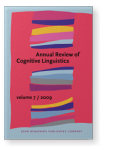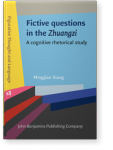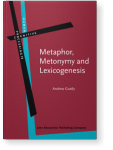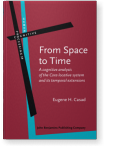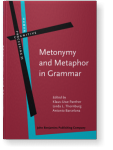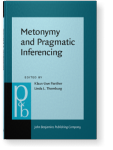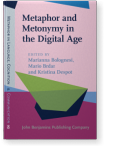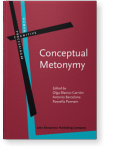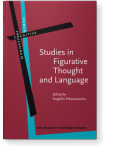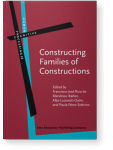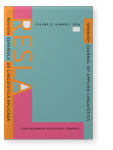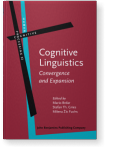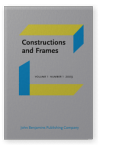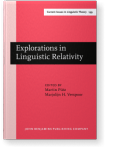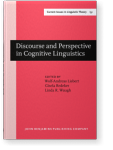Linda L. Thornburg
List of John Benjamins publications for which Linda L. Thornburg plays a role.
Yearbook
Book series
ISSN 2405-6944
Titles
From Space to Time: A cognitive analysis of the Cora locative system and its temporal extensions
Eugene H. Casad
[Human Cognitive Processing, 39] 2012. xxvii, 263 pp.
Subjects Cognitive linguistics | Historical linguistics | Languages of North America | Theoretical linguistics
Metonymy and Metaphor in Grammar
Edited by Klaus-Uwe Panther, Linda L. Thornburg and Antonio Barcelona
[Human Cognitive Processing, 25] 2009. xiii, 423 pp.
Subjects Cognitive linguistics | Semantics | Syntax | Theoretical linguistics
Metonymy and Pragmatic Inferencing
Edited by Klaus-Uwe Panther and Linda L. Thornburg
[Pragmatics & Beyond New Series, 113] 2003. xi, 280 pp.
Subjects Cognitive linguistics | Pragmatics
2019 Chapter 7. Figurative reasoning in hedged performatives Metaphor and Metonymy in the Digital Age: Theory and methods for building repositories of figurative language, Bolognesi, Marianna, Mario Brdar and Kristina Š. Despot (eds.), pp. 175–198 | Chapter
This chapter combines a cognitive linguistic and a pragmatic approach to a specific class of speech acts known as hedged performatives, such as I can offer you a five-year contract, which, despite the modal hedge can on the illocutionary verb offer, conventionally counts as an offer. We demonstrate… read more
2018 Chapter 5. What kind of reasoning mode is metonymy? Conceptual Metonymy: Methodological, theoretical, and descriptive issues, Blanco-Carrión, Olga, Antonio Barcelona and Rossella Pannain (eds.), pp. 121–160 | Chapter
In this chapter we present new arguments for a conception of metonymy as a contingent, i.e. defeasible, inferential relation between a source and a target sense within the same conceptual frame. Some scholars have raised objections against our approach to metonymy, claiming that there exist… read more
2017 Chapter 1. Exploitingwh-questions for expressive purposes Studies in Figurative Thought and Language, Athanasiadou, Angeliki (ed.), pp. 17–40 | Chapter
This chapter offers a conceptual-pragmatic analysis of the constructionWh-x do you think [
complement clause
…], which exhibits the morphosyntactic form ofwh-interrogative sentences and may indeed be used with a question meaning,… read more
2017 Chapter 4. The role of inferencing in the interpretation of two expressive speech act constructions Constructing Families of Constructions: Analytical perspectives and theoretical challenges, Ruiz de Mendoza Ibáñez, Francisco José, Alba Luzondo Oyón and Paula Pérez-Sobrino (eds.), pp. 109–134 | Chapter
We analyze two illocutionary constructions, viz. an autonomous complement clause construction, instantiated by That it should come to this!, and a wh-interrogative construction, such as What do think you are doing? Both constructions convey emotive and evaluative senses and have a factual… read more
2014 Metonymy and the way we speak Revista Española de Lingüística Aplicada/Spanish Journal of Applied Linguistics 27:1, pp. 168–186 | Article
In this article we investigate correlations between semantically equivalent expressions (organized in manner scales according to the formal properties of length, prosodic prominence, and grammaticalization) and their varying potential to trigger a certain metonymic interpretation. We focus on… read more
2012 Editors’ preface From Space to Time: A cognitive analysis of the Cora locative system and its temporal extensions, Casad, Eugene H., pp. xxi–xxiv | Miscellaneous
2011 Emotion and desire in independent complement clauses: A case study from German Cognitive Linguistics: Convergence and Expansion, Brdar, Mario, Stefan Th. Gries and Milena Žic Fuchs (eds.), pp. 87–114 | Article
We advocate the use of theoretical tools from both cognitive linguistics and contemporary pragmatics to analyze complement clause constructions that are syntactically dependent but independent in terms of their illocutionary force, as exemplified in English by That it should have come to this! Such… read more
2009 Aspect and metonymy in the French passé simple Metonymy and Metaphor in Grammar, Panther, Klaus-Uwe, Linda L. Thornburg and Antonio Barcelona (eds.), pp. 177–195 | Article
2009 From syntactic coordination to conceptual modification: The case of the nice and Adj construction Constructions and Frames 1:1, pp. 56–86 | Article
The present article investigates a construction that displays a “mismatch” between form and content/function, instantiated by expressions like nice and comfy/clean/warm. This nice and Adj pattern has a “literal” transparent meaning, which corresponds to its coordinative syntax, but it is on its… read more
2009 Introduction: On figuration in grammar Metonymy and Metaphor in Grammar, Panther, Klaus-Uwe, Linda L. Thornburg and Antonio Barcelona (eds.), pp. 1–44 | Miscellaneous
2003 Metonymies as natural inference and activation schemas: The case of dependent clauses as independent speech acts Metonymy and Pragmatic Inferencing, Panther, Klaus-Uwe and Linda L. Thornburg (eds.), pp. 127–147 | Article
2003 Introduction: On the nature of conceptual metonymy Metonymy and Pragmatic Inferencing, Panther, Klaus-Uwe and Linda L. Thornburg (eds.), pp. 1–20 | Miscellaneous
2000 Why we subject incorporate (in English): a post-Whorfian view Explorations in Linguistic Relativity, Pütz, Martin and Marjolijn H. Verspoor (eds.), pp. 319–344 | Article
1997 Speech Act Metonymies Discourse and Perspective in Cognitive Linguistics, Liebert, Wolf-Andreas, Gisela Redeker and Linda R. Waugh (eds.), pp. 205–222 | Article
